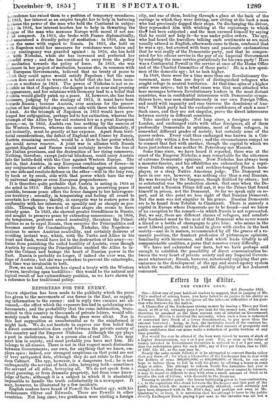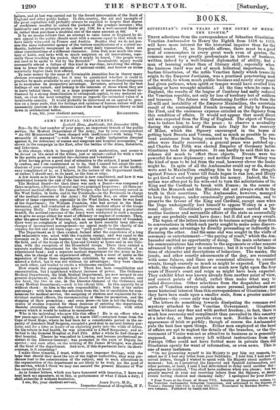rtitr tu tht
TUE COMING LOAN.
4th December 1854.
Sin—Allow one of your habitual readers to suggest, that in judging of Mr. Pitts method of raising loans, you have failed to do justice to his ability as a Finance Minister, and to recognize all the inherent difficulties of his position who borrows for the nation.
A Chancellor of the Exchequer raising money by issuing a Three per Cent Stock at 60 or 62, virtually pays 5 per cent for the money lent, which may therefore be assumed as the then current rate of interest on Government Securities. Herein is involved the necessity, when such a loan is redeemed or converted into Stock of a lower denomination, to pay more than the amount borrowed ; being, in fact, the inevitable result of the contrast between a season of difficulty and the advent of that amount of prosperity and public confidence that can alone make a reduction of public burdens at any time possible. Nor would the case be altered if the loan were raised by means of stock of a higher denomination, say 4 or 5 per cent. For, so soon as the value of money invested in Government Securities is reduced to 4 or 3 per cent, so does the redemption price for each 1001., say of Five per Cents, rise to 125/. or 166/. 138. 4d., as the case may be. Nearly the same result follows if it be attempted to convert Stocks rather than pay them off; for when a Chancellor of the Exchequer has to deal with the holders of some 300,000„0001. or 400,000,0001. of Stock, he can only hope to induce them to fall in with his plans by offering a bonus in some shape or other. The attempt to redeem South Sea Annuities last year is enough to show, that from a variety of causes, that can or cannot be foreseen, it may be found so difficult to deal with even a small amount of Stock as to involve the risk of failure, with discredit to the financier.
Turning to another point : the bonus habitualls given to loan-contractors, 1. e. to the capitalists who stand between the Exchequer and that part of the public from which the money is eventually obtained, could certainly not have been dispensed with in Mr. Pitt's day, and perhaps not even in Mr. Gladstone's; at least, it is notorious that his attempt to issue to the public directly Exchequer Bonds paying 4 per cent to the ',wester was all but a fitilure, and at last was carried out by the forced intervention of the Bank of England and other public bodies. In this country-, the aid and example of the great capitalists will probably always be required to inspire that degree of oonfidenee needful to unlock the pockets of the prudent investor; he habitually and on principle prefers to pay 1201. for a well-secured Itente of
51. rather than purchase a doubtful one of the seine amount at 801. •
It by no means follows that an attempt to raise loans in England by direct appeal to the public should meet with a success equal to that which we have lately witnessed in France and Austria. Besides that we do not possess the same influential agency of the various ramifications of a central authority, habitually reoognized in almost every daily transaction, there are ether considesations of a different character. John Bull is so much the creature of habit, and locks with an much suspicion on all innovations, especially those touching his pocket, that it might be found, " the people were not used to be spoke to but by the Recorder." Incalculable injury would necessarily attend a failure of this kind in war-time' involving the obligation. to lower the original estimate of national credit, and borrow on terms materially higher than first offered. To raise money by the iglu of Terminable Annuities has in theory many Obvious recommendations ; but it may be questioned whether it could in practice be made available to any extent, except on terms so disadvantageous an to neutralize its prospective advantage. Inveaters actuated by the best feelings of our nature, and looking to the interests of those whom they are to leave behind them, will in a large proportion of instances be found influenced by a strong disinclination to extinguish capital, to any material extent, on even the most tempting terms as regards the estimated value of a terminable annuity. It would probably be discovered on an appeal to practice on a large scale, that the feelings and opinions of human nature will not necessarily conform to the abstraetrules of the most legitimate theory as laid dawn in arithmetical tables,
I am, Sir, your obedient servant, Ilreennerro.

























 Previous page
Previous page